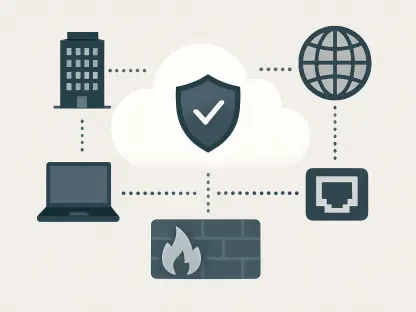In the ever-evolving digital landscape, maintaining a safe and efficient home Wi-Fi network becomes crucial for users seeking seamless connectivity and enhanced online privacy. As digital threats continue to rise and streaming services strategically restrict content by regions, VPN-ready routers emerge as viable solutions for addressing these challenges. This new category of routers is not just a tool for tech enthusiasts but an essential device that can redefine how users access and manage their home networks.
1. The Current State of Home Wi-Fi and VPN Integration
The necessity of protecting privacy and ensuring secure internet usage has become more vital as people increasingly rely on home networks for work, entertainment, and communication. Traditional methods of installing VPN applications individually on each device seem inadequate considering the expanding number of internet-connected gadgets within homes. This can include smartphones, laptops, smart TVs, and even IoT devices. The process becomes unnecessarily cumbersome and often leads to devices being left unprotected.
VPN-ready routers offer a streamlined solution by integrating VPN software directly into the router’s hardware or firmware. This integration provides blanket coverage for every device connected to the Wi-Fi network. As a result, all internet traffic from these devices is channeled through an encrypted tunnel, ensuring security and privacy across the board. By enabling VPN functionality directly through the router, households achieve comprehensive protection without the hassle of managing multiple applications and configurations.
Notably, using a VPN on every device can overload systems and negatively impact performance, but VPN-ready routers help mitigate this issue. With built-in VPN capabilities, these routers handle the encryption process, freeing devices from resource-heavy operations. Consequently, Wi-Fi networks equipped with VPN-ready routers maintain smooth performance while simultaneously safeguarding online interactions against cyber threats.
2. Installation and User Experience with VPN-Ready Routers
VPN-ready routers stand out for their relatively straightforward installation process, which becomes a significant advantage over traditional router and VPN setups. With clear and simplified guides, users can quickly navigate the setup phase, which may vary slightly depending on the manufacturer’s model or specific features. This ease of installation often attracts users who have only basic technical expertise yet seek robust online protection.
Typically, the installation involves connecting the router to an ISP modem, configuring initial settings, and selecting a VPN provider through a user-friendly dashboard. Some routers may offer predefined settings compatible with popular VPN services, simplifying the process even further. Others allow users to manually configure VPN services by importing configurations or tokens, which can be slightly more complex but enable broader customization.
Once set up, the VPN-ready router offers numerous intuitive features, all accessible via its web-based interface. These features include managing network connections, assigning VPN settings per device, and activating additional security measures like ad blocking, malware protection, and IP masking. The centralized dashboard not only enhances control but also reduces administrative burdens associated with managing individual device settings.
As users engage with these routers, they often recognize the benefits of tailored network management based on specific requirements, such as prioritizing certain devices or traffic types. The holistic control over privacy and security provided by VPN-ready routers equates to peace of mind for households, knowing that their network environment remains protected against evolving digital risks.
3. Advantages of VPN-Ready Routers Beyond Basic Use
Beyond basic security enhancements, VPN-ready routers also elevate user experiences in areas like streaming, online gaming, and access to geo-blocked content. Streaming platforms, known for imposing content restrictions based on geographical locations, present challenges for users wishing to access diverse libraries. VPN-enabled routers offer a solution through features that allow connections to be routed via different countries, effectively bypassing regional constraints and unlocking a world of content for viewers.
Online gamers, in particular, could benefit significantly from using a VPN-ready router. The reduction of latency through optimized server routing can enhance gaming experiences and provide access to geographically restricted games or servers. Moreover, such routers help shield IP addresses from potential DDoS attacks, creating a more secure and stable gaming environment even while playing online.
The multifaceted advantages of this technology extend to travelers and households with a diverse range of intelligent devices. For those frequently traveling abroad, maintaining a connection to their home services, such as online banking, becomes more secure with a VPN. Additionally, smart home devices, which often represent vulnerabilities, can benefit from an added layer of protection offered by the VPN-ready router, considering their connection to the internet and potential access points for external threats.
4. Economic and Practical Considerations
Despite the promising advantages of VPN-ready routers, prospective users must consider several economic and practical factors before incorporating them into their home networks. From a cost perspective, these routers tend to be priced higher than standard models due to the integrated VPN technology and advanced security features. While the initial investment may be higher, the potential cost savings from safeguarding against data breaches and providing simultaneous coverage across all connected devices could justify the expense for many households.
Additionally, existing contractual obligations with other VPN services might present constraints in integrating a VPN-ready router. If users are currently bound to contracts with alternative VPN providers, they should review the terms and determine the feasibility of transitioning or integrating with a VPN-ready router, as some models may allow compatibility with multiple VPN services.
Another vital practical consideration is the compatibility with existing network infrastructure. Before making a purchase, consumers should ascertain that the VPN-ready router supports the network architecture of their service provider, including the internet connection type and the required speed standards. Since network needs can vary significantly from one household to another, convenience and compatibility must be assessed based on individual requirements.
A Strategic Move Toward Comprehensive Home Network Security
In today’s fast-paced digital world, ensuring a secure and reliable home Wi-Fi network is essential for anyone wanting uninterrupted internet access and enhanced privacy. The rise in digital threats, like hacking and data breaches, along with geographical restrictions placed by streaming services, has made it increasingly important for users to find effective solutions to safeguard their online activities. VPN-ready routers have emerged as a critical tool in addressing these concerns. These advanced routers aren’t only for tech-savvy individuals; they represent a significant shift in how users can control and secure their home networks. With VPN capability built into the router itself, users can enjoy secure connections, bypass regional restrictions, and maintain privacy across all devices within the home network. This innovation simplifies the process considerably, as users no longer need to install VPN software on individual devices. Instead, everything is managed through the router, providing a centralized point of security and control. In addition, these routers allow parents to filter inappropriate content and manage children’s exposure to online threats with ease. As digital landscapes evolve, having VPN-ready routers at home isn’t just an option; they’re becoming indispensable for safeguarding privacy and enhancing connectivity in households.









